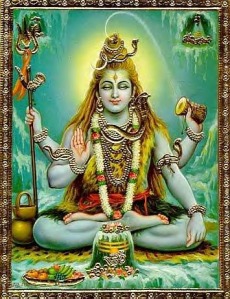Maha Mrityunjaya Mantra
OM triyambakam yajāmahe
sugandhim pushtivardhanam,
urvārukamiva bandhanān
mrrityormokshiya māmrritāt.
(Rig Veda: Mandala 7, Hymn 59, Verse 12)
Translation**:
We worship the Three-eyed one (Lord Shiva)
who is naturally fragrant, immensely merciful, and
who is the protector of the devotees.
Worshipping Him, may we be liberated from death for the sake of immortality,
just as the ripe cucumber easily separates itself from the binding stalk.
[By your Grace, let me be in the state of salvation and be saved from the clutches of fearful death.]
OR:
We worship the Father of the three worlds,
who emits the excellent fragrance which nourishes all.
As a cucumber is released from its bondage to the stem,
so may we be freed from Death to dwell in immortality.
The Maha Mrityunjaya Mantra, meaning Great Death-Conquering Mantra or Prayer of the Great Victor Over Death, has many names and forms, including the Rudra Mantra, Tryambakam Mantra, Mrita-Sanjivini Mantra, Moksha Mantra, and Markandeya Mantra. Along with the Gayatri Mantra, it is probably the most chanted and highest revered of all the mantras in Hinduism. Addressed to Lord Shiva, it is believed to generate divine vibrations that ward of negative energies and evil forces, creating a powerful protective shield around the chanter, a veritable divine armor which guards against accidents and misfortunes of every kind. It rejuvenates us, pulsating through every cell and molecule in our body, tearing away the veil of ignorance, and igniting a fire within us that consumes negativity, purifying our entire system. Many believe this centuries old mantra can heal diseases declared incurable, and bestows health, long life, peace, prosperity, and contentment. We evoke Shiva within, who removes the fear of death, liberating us from the cycle of death and rebirth and connecting us to our own inner divinity.
Depending on which text you read, there are several accounts regarding the origins of this mantra. The Puranas tell the story of a childless sage, Mrikandu, and his wife, Marudvati, who had gained great spiritual knowledge and wisdom. Through their penance and meditation on their desire to have a child, Lord Shiva was pleased and blessed them with a boon, offering them a divine son who would only live sixteen years, or a foolish son who would live one hundred years. Shiva knew their choice, and was not surprised when they chose the divine child, whom they named Markandeya. By the time the boy was eight, he knew all of the holy scriptures and his sagely parents taught him the tools to attain spiritual knowledge, which he performed with great devotion. They did not tell him about the shortness of his life, but, as his sixteenth year approached, their sadness exposed what Lord Shiva had revealed. On the day of his sixteenth birthday, Markandeya took sanctuary in a Shiva temple, and began his meditations opposite a Shiva Lingam. When the messengers of Yama, Lord of Death, arrived to take him away and began to pull the prana out of his body, the boy embraced the holy Lingam and, full of devotion, burst into the Maha Mrityunjaya Mantra. The messengers could not complete their task and returned to their Lord, who went himself to the temple, urging Markandeya to come willingly and follow the natural laws of life and death. The boy tightened his grip around the Shiva Lingam, and surrendered himself to its protection. Yama threw His noose around the nose of the boy to collect him, but threw it too far and it encircled the Lingam as well. Dwelling in the image, Lord Shiva split the Lingam in his rage and appeared, killing Yama with His foot for encroaching on His authority. Although Yama had no jurisdiction to throw the noose over Him, the other Gods implored Lord Shiva to bring Yama back to life, lest the order of the universe be upset by His death. Shiva complied, and then turned to Markandeya and declared, “It is true that your karma decrees you must die by the age of sixteen. However, there are still a few minutes left before you reach your sixteenth birthday, therefore, I stop your aging process at this very moment. You shall not get any older, thus, death may never claim you.” Shiva blessed Markandeya to become the ever-living master of the Himalayas, and a powerful spiritual discipline to promote healing was born.

Maha Mrityunjaya Mantra in its original Sanskrit.
*There is an urban legend attributing this to the Dalai Lama, however, it is actually a Dutch man named Hein Braat, who is self-taught and performs traditional chants with his own unique character. I find his voice addictive and strikingly beautiful and feel compelled to suggest you buy his CDs because the sound quality is much better and he is an artist deserving of your patronage.
**An exact translation of the Vedic mantras is next to impossible, so we rely on the interpretations from spiritual, sacrificial, physiological, and sociological perspectives, provided by venerable Swamis and Yogis over the centuries. Understanding the words is important to make the repetitions meaningful, so here are two word-by-word translations of the Sanskrit.
